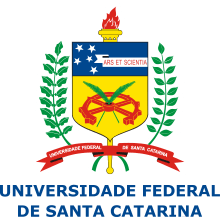Federal University of Santa Catarina
 | |
Other names | UFSC |
|---|---|
| Motto | Ars et Scientia |
Motto in English | Arts and Science |
| Type | Public |
| Established | 1962 |
| Rector | Roselane Neckel |
Administrative staff | 4,539 |
| Undergraduates | 25357 |
| Postgraduates | 8543 |
| Location | Florianópolis, Santa Catarina, Brazil |
| Campus | Urban |
| Website | www.ufsc.br |
The Federal University of Santa Catarina (Portuguese: Universidade Federal de Santa Catarina, UFSC) is a public university in Florianópolis, the capital city of Santa Catarina in southern Brazil. Ranked as the 4th best overall university in Latin America by the Webometrics Ranking of World Universities, it is one of the leading Latin American research universities, being the third largest university in Brazil and the fifth in Latin America, noted for its engineering school, and the only Federal University in the state of Santa Catarina. UFSC is internationally known for the quality of its courses in mechanical engineering, control engineering, sanitary engineering, electrical engineering and dentistry.
The organization of its campus is done in the 11 Centers of Education (Centros de Ensino), divided by field of study. Every Center of Education is divided in departments, the largest one being the Department of Mechanical Engineering. The oldest is the Center of Juridic Sciences, that is itself the department of Law, which was the first of UFSC's departments to be officially recognized in 1932.
History
The history of Federal University of Santa Catarina has its roots in the Polytechnic Institute of Florianópolis founded on March 13 of 1917 by José Arthur Boiteux. Organized as a free institute, it was the first college degree institution of Santa Catarina state. On February 11, 1932 the Law School was incorporated, officially in 1935.
That triggered a movement to start the first state university and on December 18 of 1960 it became the University of Santa Catarina, offering the courses of Law, Medicine, Pharmacy, Philosophy, Economics, Social Service and the School of Industrial Engineering. On July 15, 1968, as an effort of Brazilian government to improve college education in Brazil with education reform, the major universities in Brazil were reorganized in Centers and Departments and acquired a new education structure, more resembling the American and English methodology. Since then the university became the Federal University of Santa Catarina.
In 1961 the institution has earned a new place in the city to build its structure, located in the region of Trindade near downtown Florianópolis. The area was previously occupied by a model farm called Assis-Brasil and is located near the coast, having several streams crossing the actual campus. The moving was finished in 1980.
A young university, the Federal University of Santa Catarina continues to grow. It has several new buildings being built on its campus, almost all of them being financed from research and projects of the laboratories, which are themselves being expanded, the latest completed being the Center of Thermophysics proprieties and the Block A3, which has several laboratories of the Department of Mechanical Engineering. At the moment, there are two additional buildings under construction, related to the Department of Informatics and Statistics and to the Department of Automation and Systems.
 First installation of the Law school
First installation of the Law school
Admissions
The Universidade Federal de Santa Catarina undergraduate admission process is almost similar to all others in Brazil, using written tests called vestibular. In late years this process of admission has been criticized and altered. In the 2007 the institution approved the quota system proposed by the Ministry of Education in early Luis Inácio Lula da Silva government, which makes 10% of places for incoming students available to racial minorities and 20% for students coming from public schools.
In 2013 the highest admission grades were to the following courses:
- Medicine: 80.77 of 100 points possibles
- Chemical Engineering: 73.09 of 100
- Mechanical Engineering 72.78 of 100
The admission process for grad school is more complex and usually involves a test and a recommendation from the previous college. People interested in graduate courses at UFSC should contact the department of the intended course directly. The Brazilian Ministry of Education, through CAPES (Coordenação de Aperfeiçoamento de Pessoal do Nível Superior, Superior Level Personnel Enhancement Coordination) evaluates graduate programs in Brazil every three years, ranking them from 1 (worst) to 7, being 6 excellence and 7 the international excellence level.
The following graduate courses at UFSC have received grades 6 or 7, as per the last CAPES evaluation:
- Chemistry
- Chemical engineering
- Mechanical engineering
- Electrical engineering
- Pharmacology
- Law
- Philosophy
Numbers
2004 numbers, provided by the institution.
- 62 undergraduate courses;
- 48 Master courses;
- 33 doctorate courses;
- 32,286 students (total);
- 1,552 professors;
- 2,987 auxiliary staff.
Centers of Education
- Center of Health Sciences - CCS
- Center of Sports - CDS
- Center of Education Sciences - CED
- Social and Economics Center - CSE
- Center of Technology - CTC
- Center of Communications and Expression - CCE
- Center of Juridic Sciences - CCJ
- Center of Agronomic Sciences - CCA
- Center of Biologic Sciences - CCB
- Center of Physics and Mathematics - CFM
- Center of Philosophy and human Sciences - CFH
Notable faculty
- Alvaro Toubes Prata, professor of Mechanical Engineering, member of the Brazilian Academy of Sciences
- Sergio Colle, professor of Mechanical Engineering, member of the National Academy of Engineering
See also
External links
- University website (Portuguese)
Coordinates: 27°36′04″S 48°31′12″W / 27.60111°S 48.52000°W